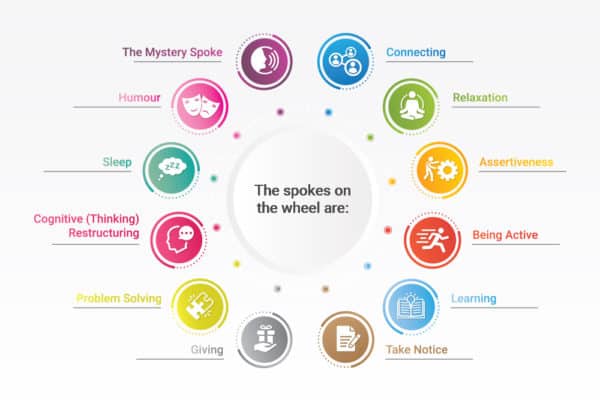
As a mental health practitioner for over 40 years, the emphasis in my training was mental illness, from Anxiety to Anorexia, Depression to Dementia and Self Injury to Schizophrenia.
We knew all about illness, but what we didn’t know about was how to help someone to stay mentally well. Why is it that one person becomes distraught at not gaining a promotion whilst a different colleague will simply dust themselves off and try again? Why do some people struggle to cope with their workload while others seem to enjoy the challenge? Why are some of us terrified of complaining about a person’s bullying behaviour while others will tell a bully where to get off?
Mental Health is Always Changing
Being mentally well isn’t a permanent state. It fluctuates. Good feedback from a manager can make us feel great, appreciated and confident. Criticism can cause us to believe we are performing poorly at our work and probably due to be sacked!
A Wheel on the Road of Life
In an attempt to describe the dynamic nature of our mental status, I will compare it to a wheel, whilst our journey of life is a road. When that road is smooth and flat, our mental health wheel turns, running freely and easily, but there are many occasions in life when we encounter “bumps”, ”holes” and ”rocks”, preventing our wheel from running smoothly or even causing it to buckle.
It’s a fact that, try as we can, there will always be challenges to our emotional well-being.
Within the field of mental health we call these challenges stressors, and like the bumps, holes and rocks, stressors are always encountered throughout the journey we call life.
We may not be able to make the road perfectly smooth, but what we can do is make our wheel stronger and more durable, more able to withstand stressors and keep turning. Spokes strengthen the wheel, help it to keep its shape and stay strong. Whilst the tyres allow the wheel to soften the “bumps” and keep moving.
Developing Mental Health Resilience
In order to handle the challenges of life, we need to develop mental resilience. According to a dictionary definition, resilience is the ability to recover quickly from illness, change or misfortune; the ability to be buoyant.
Resilience develops from a variety of factors. Many of these factors are based on research and are common to all of us, no matter how old we are.
Other factors are exclusive to you and are what you already use to help you stay well. The wheel of resilience is strong because the spokes that help it overcome stressors enable it to keep its shape.
As you can see, there are 12 spokes in this wheel and I will explain how each spoke can enhance and strengthen your emotional well-being.
The Wheel of Resilience

The spokes on the wheel are:
- Connecting
- Relaxation
- Assertiveness
- Being Active
- Learning
- Take Notice
- Giving
- Problem Solving
- Cognitive (Thinking) Restructuring
- Sleep
- Humour
- The Mystery Spoke
Over the coming weeks, I’ll begin exploring why each of these spokes is vital to thinking well and feeling good. I’ll look at why they are important and little things we can all do to work them more into our lives.



























































































































































































































































































































































































































































































































































































































































































































































